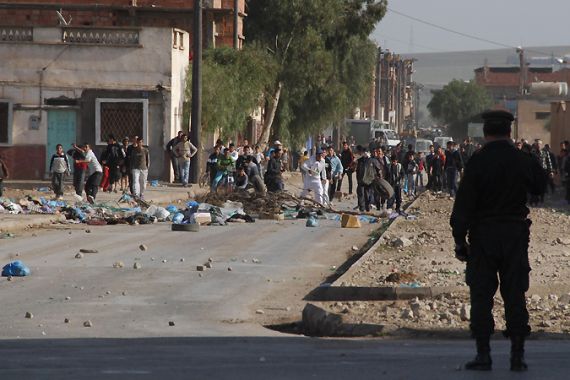Algeria police on alert after riots
First protester’s death reported and football matches cancelled following fresh unrest in North African nation.

 |
| Top-level football matches scheduled in Algeria on Friday and Saturday were scrapped in wake of the riots [EPA] |
Riots have taken place across Algeria for a third day, with protesters taking to the streets over rising prices and unemployment.
The first protester’s death was reported by the website of Al Khabar newspaper on Saturday. The previous day, sources told Al Jazeera that heavy police reinforcements had succeeded in reducing the number of young men rioting on the streets.
Police were deployed outside mosques and a university in Algiers on Friday after fresh rioting had erupted the previous night.
About 40 youths armed with swords had attacked several shops in the El Biar area of Algiers late on Thursday, looting a restaurant and emptying a jewellery store before security forces arrived, local reporters and witnesses said.
Police were positioned around mosques in the working-class suburbs of Bab el Oued, Belcourt and Bachjarrah, in anticipation of more unrest after Friday prayers.
There was also extra security at a police station, a new shopping mall and a major hotel in an area near Bab Ezzouar airport, while a nearby university was surrounded by security forces.
Rioters clashed with police in Annaba, a coastal city near the border with Tunisia, on Friday following the afternoon prayer, the Algerian daily newspaper El-Watan reported. Annaba had been spared from the rioting until today.
Protests continued in Oran in the west on Friday, where the riots first began two nights ago.
Hachemi Djiar, the Algerian youth and sports minister, said on Friday that “violence has never brought results, either in Algeria or elsewhere, and our young people know that”.
Social trauma
Salima Ghezali, a leading Algerian journalist and human rights activist, told Al Jazeera in a phone interview that the outbreak of protests is “both very local and very global”.
Algerians have followed protests over economic dissatisfaction not only in neighbouring Tunisia, but also in Europe.
|
|
At the same time, she said the rioting is a consequence of years of economic and political mismanagement.
Although hardly a week goes by without geographically-specific protests over particular incidents, she said that the nationwide movement that has sprung up this week is very different.
“This is affecting a large part of the Algerian territory,” she said.
Asked if this week’s rioting is comparable to the October 1988 demonstrations that forced the government to grant wider media freedom and hold the country’s first democratic elections (which were subsequently halted by the military), she said the current political situation is far grimmer.
“Unlike in 1988, the country today is deeply traumatised,” she said, refering to the “dirty war” of the 1990s that left 200,000 people dead and an estimated 20,000 forcibly disappeared.
There has never been any investigations into the alleged war crimes committed by all sides during this civil war.
Despite coming in the context of monoparty rule by the FLN, the 1988 uprising found political leadership in both the “Islamist” and the left-wing opposition movements, Ghezali told Al Jazeera.
Algeria is now a democracy, but the FLN remains in power. Opposition parties argue there is little space for them to participate in the political sphere.
Those movements have been severely weakened over the past two decades and have been “targeted by repression”.
She said that the government led by President Abdelaziz Bouteflika, meanwhile, is ignoring the social and economic woes endured by most Algerians.
“We are heading towards a social disaster,” she said. “They don’t seem to realise this.”
“I hope with all my heart that I am wrong.”
‘Intifada’
Saad Djebbar, an international lawyer and political analyst told Al Jazeera that the popular uprising is rooted in ordinary Algerians’ deep-seated disillusionment in the ruling class and a widening gap in the distribution of wealth.
“There is a deficit in accountable government, in other words, no democracy,” he said.
“You have really … deeply-rooted corruption of officials of the whole regime, people can see it,” he said.
Jeremy Keenan, a social anthropologist said that the social revolt is an uprising, rather than a protest movement.
“The word that I’m hearing on the streets of Algiers isn’t protest, it’s Intifada,” he told Al Jazeera.
There has been a “massive show of repression” by the state, he said, citing the police reinforcements.
He noted that the authorities appeared to be taking care to avoid killing any protesters, “probably because they’re scared”.
Similar protests have rattled neighbouring Tunisia since mid-December.
El-Watan reported that several people had been wounded in the Algerian clashes, but the official media has made no comment and authorities have only assured that they are tackling the spike in costs.
About 75 per cent of Algerians are under the age of 30, and 20 per cent of the youth are unemployed, according to the International Monetary Fund.
Football matches scrapped
All top-level football matches scheduled in Algeria on Friday and Saturday have been scrapped, the national football league has announced.
Travellers said a road between the capital and eastern suburbs on the coast had been blocked since Thursday afternoon after youths set up barricades, also clashing with security forces.